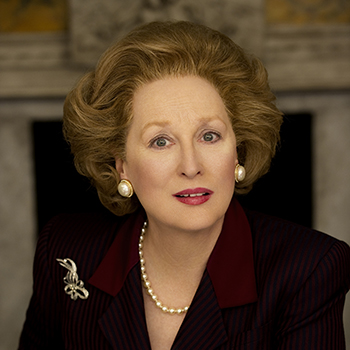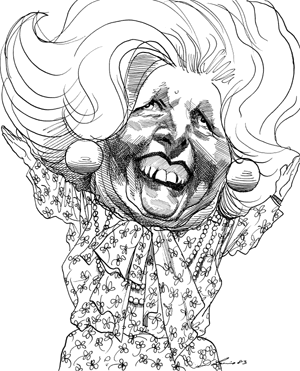Among the impenetrable mysteries of modern life is how Meryl Streep can be universally regarded as the greatest dramatic film actress of our time. In my opinion, Streep is easily at her best as a comedienne, not in the high-serious roles she has favored.
This was demonstrated most recently by her witty embodiment of an Anna Wintour-like fashion magazine editor in David Frankel’s The Devil Wears Prada. She was also marvelous as the cowed actress daughter of a formidable actress mother in Mike Nichols’s Postcards from the Edge (1991), and as the betrayed wife of a philandering columnist in his Heartburn (1986). She won an Oscar nomination for the title part of a good-ole-girl whistleblower in Silkwood (1983), also a Nichols production, which puts her in company with Elizabeth Taylor (Who’s Afraid of Virginia Woof?) and Ann-Margret (Carnal Knowledge) among other actresses who have done their finest work for this esteemed director.
Now we have the 62-year-old Streep in what many critics deem the crowning achievement of her storied 35-year Hollywood career, as Margaret Thatcher in the starring role of Phyllida Lloyd’s The Iron Lady. But when I watched this strange tour de force of Important Acting, I was uncertain whether I was witnessing a tragedy or a farce.
To be sure, there is a certain piquance in Streep, that inveterate vocal chameleon, impersonating a British prime minister whose own altered accent and lowered tonal production were of considerable import in a class-obsessed country where one’s status is instantly pinpointed by telltale speech indicators. Streep-as-Thatcher overenunciates nearly every phrase in the same way the Iron Lady herself did, in contrast to the clipped-and-swallowed speech patterns of the aristocracy. With her flair for mimicry, the actress is clearly aware of such nuances, and many of her line readings here are hilarious. I laughed out loud when she breathily intoned, apropos some draconian Thatcher budget cut, “YES, the med-cine will be HOSH…”
Nonetheless, thoughts of performers other than Thatcher kept popping into my head as I watched Streep’s latest, grimly fascinating turn—the film traces the British leader from her childhood in the northeastern town of Grantham (where we see young Maggie [Alexandra Roach] doughtily protecting her family’s rationed butter during a World War II bombing raid), to her improbable climb to the top of the class-ridden Conservative Party, to her eleven contentious years in power, and finally to her present-day senescence. Take the scene where the bellicose prime minister excoriates US Secretary of State Alexander Haig (Matthew Marsh) for America’s hesitancy to endorse her jolly little war with Argentina to regain control of the Falkland Islands. Streep flares her nostrils, shakes her head, and snarls so menacingly that she could well have been channeling Faye Dunaway channeling Joan Crawford in Frank Perry’s Mommie Dearest (1981).
In another flashback, we find Thatcher hectoring her beaten-down daughter, Carol (Olivia Colman), as she practices for her driving exam. Here Streep comes on like Hyacinth Bucket, the social-climbing suburban bossyboots portrayed with Thatcherian brio by Patricia Routledge in the 1990s BBC-TV comedy Keeping Up Appearances. Thatcher’s dutiful offspring suffers in silence while her demanding and ungrateful mother reflexively favors the girl’s unseen twin brother, the scoundrelly Mark, an inequity certain to hit home with many viewers.
Presumably with Streep’s uncanny virtuosity in mind, disproportionate attention is also paid to Thatcher in her dotage. In a 2008 memoir, Carol Thatcher revealed that her mother, now 86, is suffering from dementia after a series of mini-strokes. Here we find Streep stooped and shuffling about a dimly lit, genteelly decorated evocation of the London house where Thatcher now lives, communing at length with the voluble ghost of her jovial husband, Sir Denis Thatcher (Jim Broadbent), who died in 2003. At one point he puckishly wraps a pink chiffon scarf around his head like a turban, and met by a reproving scowl from his humorless spouse, he asks in Raj pidgin, “Boss Lady no like?,” in response to which she fairly growls, “Boss Lady NO LIKE!”
As the “leaderene” in her 1980s heyday, Streep bustles and blusters and rolls her eyes with such exaggerated energy— Thatcher’s preternatural busyness stemmed in part from a hyperactive thyroid—that she seems a matronly drag queen. In her post-millennial decline, she squints and sighs and wheezes with no less exertion, but no more persuasively. She makes getting into bed (admittedly a difficult act for many of the aged) seem as drawn out and consequential as a Verdi death scene. Those who have praised this portrayal of pathetic old age as something on a par with the greatest interpreters of King Lear must themselves be slipping into second childhood to be taken in by such transparent hokum.
Advertisement
Conversely, Thatcher’s actual policies and their wider ramifications are barely touched upon. All we get is her spouting Victorian platitudes about self-sufficiency and thrift, or short takes of her during parliamentary shouting matches and sitting imperturbably in her car as protestors rage around her. Neither is much made of the immense contradiction in her being Britain’s first female premier but insisting, “I owe nothing to feminism.”
Lloyd and her screenwriter, Abi Morgan, missed a golden opportunity when they neglected to depict the superficially correct but increasingly tense relations between Thatcher and Elizabeth II, a baffling omission after the enormous success of Stephen Frears’s The Queen (2006) and Tom Hooper’s The King’s Speech (2010). One can only imagine the sparks that might have flown if The Iron Lady had featured Helen Mirren (or someone of comparable talent) in a cameo reprise of her sly and convincing characterization of the monarch in the Frears film.
There is much delicious anecdotal material that could have underscored one of The Iron Lady’s subthemes: that Thatcher had to battle not only a deep-seated anti-female bias in her rise to the top, but also endured class prejudice directed against her as a Lincolnshire grocer’s daughter by the Tory establishment. Even in her ascendancy, Thatcher was subjected to rank-pulling from the sovereign herself.
Buckingham Palace directed the Foreign Office that the national anthem was not to be played when Thatcher deplaned on visits abroad, an honor that is, strictly speaking, due the queen alone as chief of state. Fault was found even in the smallest details of deference. Alan Clark, a Tory MP and junior minister in Thatcher’s cabinet, recalled, “It was always said that she curtseyed very, very low and this was an object of private mockery at the Palace.” And when the head of government suggested that she ought to know what the queen would be wearing on public occasions so that their outfits did not clash, she was coolly informed that Her Majesty pays no attention to the attire of others—which is of course a bit disingenuous given the habitual color-coordination among the royal ladies.
More substantively, their already frayed relations deteriorated further in June 1986 when a detailed front-page story leaked by courtiers appeared in the Sunday Times, headlined “Queen dismayed by ‘uncaring’ Thatcher.” Clark termed this nearly unconstitutional affair “a put-up job to cut Thatcher down to size.” Such pecking-order put-downs could have been quickly and entertainingly conveyed in The Iron Lady, which is so tediously repetitive—with too many faux home movies and pointless conversations with the dead Denis—that it feels overlong even at its relatively compact hour-and-three-quarters running time.
Acting tends to travel poorly across time. Edmund Kean’s overwrought, declamatory, gymnastic approach to Shakespeare won a wildly enthusiastic London claque during the Regency but would appear utterly ridiculous onstage today. Film is a cruel preserver of performances that would otherwise be filtered through fond reminiscences rather than be accountable to concrete visual evidence. A compilation of clips shown in the television broadcast of last year’s Kennedy Center Honors, at which Streep was one of five honorees, gave hints of the unkind process already at work.
One after another, the excerpts unreeled her repertoire of parts in which she deployed a panoply of showy but dubious foreign and American regional accents, including bogus British in The French Lieutenant’s Woman (1981), adenoidal Danish in Out of Africa (1985), and hardboiled Bronx in Doubt (2008), though not her embarrassingly misjudged surly Australian mum in A Cry in the Dark (1988), which made an ironic catchphrase of her lament, “The dingo took my BYE-bee!”
Several generations ago, Helen Hayes was inevitably accorded the sobriquet of “The First Lady of the American Theatre,” though now her saccharine portrayals would doubtless make one’s teeth ache. It is easy to imagine that future generations will look back on today’s credulous admiration for the undeniably gifted but habitually histrionic Streep with a similar mixture of bafflement and bemusement.




